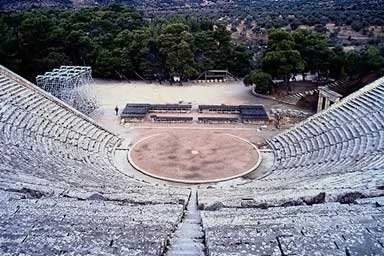The Theater in Ancient Greece
 Theater in ancient Athens was performed at the agora. Later, the theatrical events became so big that they were moved to an open-air auditorium below the Athenian Acropolis. Open-air auditoriums were built in most Greek cities, some holding as many as 15,000 spectators.
Theater in ancient Athens was performed at the agora. Later, the theatrical events became so big that they were moved to an open-air auditorium below the Athenian Acropolis. Open-air auditoriums were built in most Greek cities, some holding as many as 15,000 spectators.
Theater performances became part of the religious festival to Dionysus, the god of wine. The festival lasted five days and had as many as three full dramas performed in one day. The dramas were judged contests, and the winning actors and playwrights received prizes. The dramas were sponsored by rich citizens know as choregoi.
 Three types of plays were developed in ancient Greece, the tragedy, the comedy, and the satire. A tragedy was about Greek heroes and gods. The plots often showed conflicts between men and gods, and the endings were often bad for the main characters. Comedies were often politically-based stories, or they featured conflicts between men and women. They were meant to be lighthearted fun. Satires were often witty, cutting, and ironic stories that mocked human vice and folly.
Three types of plays were developed in ancient Greece, the tragedy, the comedy, and the satire. A tragedy was about Greek heroes and gods. The plots often showed conflicts between men and gods, and the endings were often bad for the main characters. Comedies were often politically-based stories, or they featured conflicts between men and women. They were meant to be lighthearted fun. Satires were often witty, cutting, and ironic stories that mocked human vice and folly.

Greek Education and Culture
Astronomy Education Math and Science Medicine Paintings

